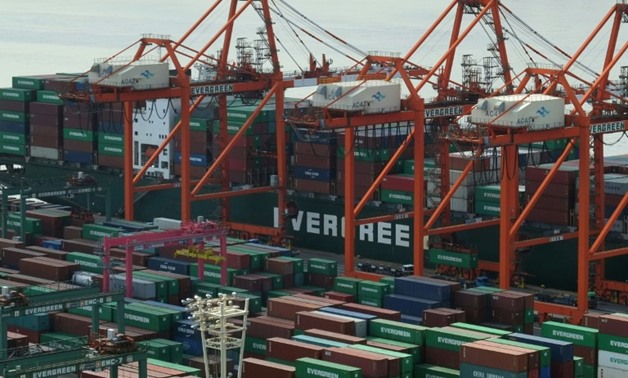
Containers sit piled on the docks as a ship sits docked at the international cargo terminal at Tokyo's port on February 19, 2018
PARIS - 13 December 2018: The European Parliament on Wednesday approved an accord with Japan that has been dubbed the world's biggest trade deal, covering economies that represent a third of the world's GDP.
The agreement will go into effect in February and was celebrated as a victory for Europe as a free trade champion in the face of US President Donald Trump's protectionism and Britain's decision to leave the EU.
"Our economic partnership with Japan -– the biggest trade zone ever negotiated –- is now very close to becoming a reality," EU Trade Commissioner Cecilia Malmstrom said.
Talking to AFP before lawmakers voted by 474 votes to 152 to back the deal, Malmstrom called it "a symbol, a signal" and added: "We're showing that for our part, we're in favour of open but regulated trade."
The deal was confirmed even as British Prime Minister Theresa May defended her faltering attempt to negotiate Britain's orderly departure from the European Union before a boisterous House of Commons.
But, ironically, some EU leaders see the wide-ranging deal they have agreed with far-off Japan as a possible model for future commercial relations with the United Kingdom, once it formally quits the bloc.
"Everything is uncertain with the United Kingdom for the moment, but one day or another we'll have to negotiate something," Malmstrom said, predicting a British deal would "go even further" than Japan's.
Covering more than 630 million people and economies that add up to around a third of global output, the EU-Japan Economic Partnership Agreement has been under discussion since 2013.
When it goes into effect it will regulate almost all commerce between the Asian giant and the 27 remaining EU economies and, according to Malmstrom, will benefit in particular European farmers.
The pro-business lobby welcomed the deal.
"Approving the EU-Japan EPA, the European Parliament delivers on what business and citizens need in a time of political and economic uncertainty," said BusinessEurope Director General Markus Beyrer.
"This agreement is projected to increase exports between the two economies by 34 percent for the EU and 29 percent for Japan, liberalising up to 99 percent of bilateral trade," he argued.
"The elimination of tariffs will save consumers and importers one billion euro per year in the EU and will support a substantial increase of jobs, maximising benefits for both companies and citizens."
Once the is fully implemented, some 85 percent of EU farm products will be eligible for tariff free export to Japan, although in some cases this will come after a period of transition.
Customs duties on beef, for example, will be progressively reduced, and rice, a source of national pride in Japan, will be excluded from the deal.
Tokyo has also agreed to recognise more than 200 "geographic signifiers", allowing iconic European products like Roquefort cheese, Tirolean speck and Polish "Wodka" to protect their brand value.
For their part, the Japanese will win free access to the European automobile market after a multi-year transition period.
- Consumer choice -
In a nod to the environmental and anti-globalist groups who have lobbied against this and other EU trade agreements, it includes chapters on sustainable development and the Paris climate change accord.
This was not enough to appease at least three NGOs -- the Foundation for Man and Nature (FNH) the Veblen Institute and Foodwatch -- who denounced a deal they said was "negotiated in the shadows".
"The European Parliament agreed to a trade agreement that damages European democracy," Lena Blanken of Foodwatch said.
The deal "restricts the legislative authority of the EU and its member states, jeopardises the European precautionary principle and establishes committees without sufficient democratic control."
But Malmstrom was unrepentant.
"With or without a deal, we do trade with far off countries. That's commerce," she told AFP.
"In the end, it's consumers who decide," she said, adding that, while many might prefer to buy locally, Europe would work with Japan to reduce the environmental impact of long-distance shipments.
With the deal, the EU is seeking access to one of the world's richest markets, while Japan hopes to jump-start an economy that has struggled to find solid growth for more than a decade.


Comments
Leave a Comment